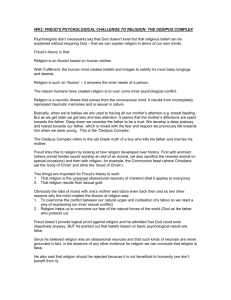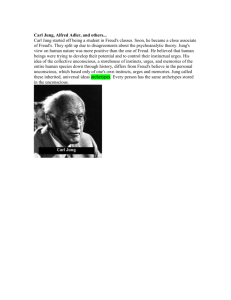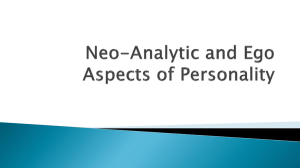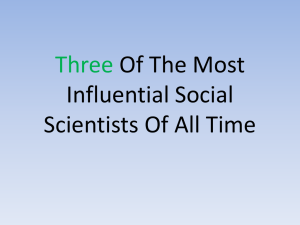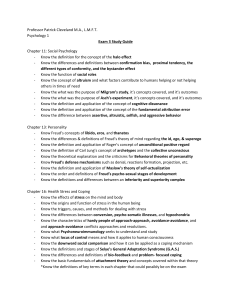freud_on_religion_
advertisement
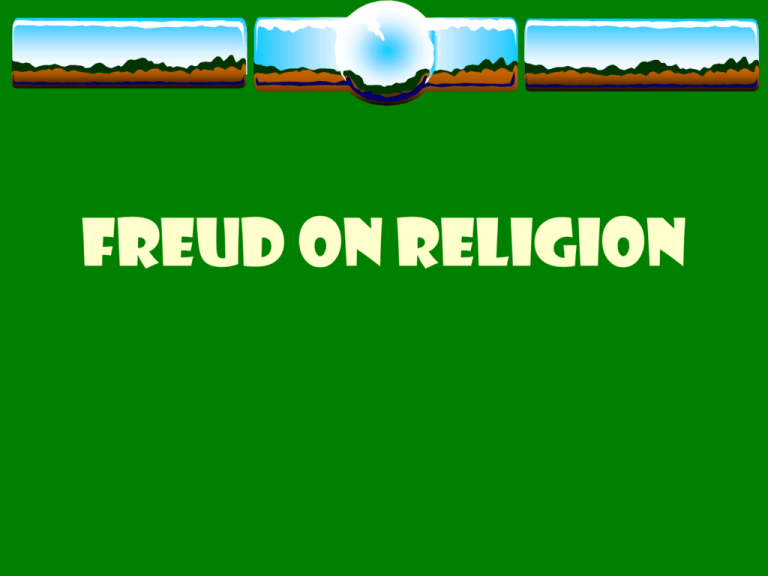
FREUD ON RELIGION
SIGMUND FREUD
Born 1856 in Moravia
Died 1939 in London
Lived in Vienna between
the ages of 4 & 82
Trained as a medic;
became interested in
psychology of neurotics.
His pet hates were
America and religion.
METHODS OF INSIGHT INTO THE
HUMAN UNCONSCIOUS
Freud used four techniques as windows on the
unconscious mind:
[1] Hypnosis
[2] Analysis of dreams
[3] Free-association
[4] Freudian slips
INTERPRETATION OF DREAMS
“The interpretation of dreams is the royal road to a
knowledge of the unconscious activities of the
mind.”
“ A dream is a (disguised) fulfilment of a
(suppressed or repressed) wish.” Plus the ‘residues
of the day’.
Dreams are a kind of code for Freud. If you can
crack it, you find the problem and can set about
curing it.
MAJOR DISCOVERIES
He
claimed two major discoveries:
The Unconscious
The Oedipus Complex
He believed that he had come to a deep
understanding of the human mind and of the
workings of human sexuality via these insights.
Structure of the mind
The
EGO: the conscious self: the obvious
everyday personality.
The ID: the unconscious self: repressed desires
and memories.
The SUPEREGO: the standard of morality of
society forced onto a person from the outside, by
which a person lives.
Freud and sexuality
Rumour has it that Freud was pretty obsessed by the idea
that sex was behind, well, just about everything.
SEX EXPLAINS EVERYTHING!
According
to Freud, childhood traumas are often
sexual in nature.
Infantile sexuality is real; children are sexual
beings.
Sexuality is basic to personality. It refers to
affection, love and sensuality in the widest sense.
‘Libido’ is his term for ‘sexual’ drives.
at this point we should have a suitable
image downloaded from the internet
Not what you were expecting huh! OK, so we are all
interested in sex! But icebergs are really cool!
The oedipus complex
Male children are first attached to their mothers and later
see their fathers as rivals for her love.
This results in repressed feelings of fear and jealousy plus
guilt. They surface in puberty.
A man’s goals in life are:
[1] Detachment from his mother.
[2] Reconciliation to his father
[3] Find someone to love who is not identical to his
mother.
Freud on religion - 1
Probably wrote more on
religion than any other
topic.
Major works, Totem &
taboo, (1913);The Future
of an Illusion (1927).
Religion is ‘wish
fulfilment’; ‘the universal
obsessional neurosis’.
FREUD ON RELIGION - 2
At
its roots, religious rituals are like neurotic
obsessional acts.
We have acquired ‘taboos’ – prohibitions.
In the ritual slaying and eating of the totem animal
lies the Oedipal wish to kill and devour the father.
Religion is thus mankind’s Oedipus Complex.
FREUD ON RELIGION - 3
Religion
has a historical development:
Firstly animism, secondly polytheism, thirdly
theism.
Magic is replaced by religion which in turn will be
replaced by science.
Nowadays his theories about the cultural and
historical development of religion have been
largely discredited.
AN ALTERNATIVE SUMMARY OF
FREUD ON RELIGION
Religion
is an illusion based on human wishes.
It is created by the mind to help us overcome:
[1] inner psychological conflict
[2] stress, which stems from the structure of
society
[3] fear of dangers of the natural world.
Religion as an aid to overcoming inner
psychological conflict
Religion
is a form of neurotic illness
It stems from the unconscious mind
It results from incompletely repressed traumatic
memories
The trauma is invariably sexual in nature
Therefore religion is an illusion resulting from
sexual difficulties.
Can Freud’s theory be
supported?
Two
elements are essential to the success of
Freud’s account of religion:
{1} That the Oedipus Complex is a universal
sexual trauma
{2} That the buried trauma can reappear in the
form of religion.
Critical evaluation
“almost
all the evidence that Freud presents has
been discredited in one way or another” – Michael
Palmer (‘Freud and Jung on Religion’)
[1] no evidence for the primal horde
[2] no evidence for the Oedipus Complex
[3] Freud’s dependence on a narrow selection of
evidence is a weakness in the theory
[4] Freud’s conclusion that religion should be
overthrown is an unfulfilled wish of his.
A conclusion
Perhaps Freud’s account is an
example of his own wishfulfilment.
Perhaps he concocted this rather
fanciful account of religion as a
way of wishing away the reality
of God and coping with the bad
experiences he had with religion
in his own childhood.
AN ALTERNATIVE PSYCHOLOGICAL
VIEW OF RELIGION: Jung -1
“While Freud, characteristically,
established causal links stretching
back into childhood which imply a
mechanistic account of human
behaviour, Jung was concerned to
place man in a historical context
which gave his life meaning and
dignity and ultimately implied a place
in a purposeful universe.”
David A. G. Cook
AN ALTERNATIVE PSYCHOLOGICAL
VIEW OF RELIGION: Jung -2
“ Unlike Freud, Jung was in favour of
religion, thought that religious experiences
were in some sense real, and held that
religion was needed by society.” Michael
Argyle,
Psychology and Religion, Routledge, 2000.
P104
“Those who reject religion are … more likely
to experience neurosis as a result of the
remaining psychological tension…Jung can
conclude that religion is a valuable entity.”
Jordan, Lockyer, Tate,
Philosophy of Religion for A-level, STP, 1999, p117
AN ALTERNATIVE PSYCHOLOGICAL
VIEW OF RELIGION: Jung -3
The details of Jung’s psychological theories
are rather complex and involve a little
study. Key ideas are those of archetypes,
individuation, individual unconscious,
collective unconscious, neurosis, libido,
harmonisation, persona & shadow.
A good treatment of these in found in the
Jordan et al volume and you can study this
with the study guide Mr. Brown has written
to go with it.
AN ALTERNATIVE PSYCHOLOGICAL
VIEW OF RELIGION: Jung -4
Jung replaced Freud’s conclusions with the
following observations:
•Religion is a natural process that stems from
archetypes within the unconscious mind
•It performs the function of harmonising the psyche
•As such, it is a beneficial phenomenon
•The removal of religion would lead to
psychological problems
AN ALTERNATIVE PSYCHOLOGICAL
VIEW OF RELIGION: Jung -5
Critical appraisals of Jung’s work focus on
four main areas:
•Jung’s methodology
•The theory of the archetypes
•Jung’s concept of religious experience
•The role of religion within individuation
Who is right?
John Hick’s conclusion about Freud is
worth quoting:
“it seems that the verdict must be ‘not
proven’; … the Freudian theory of
religion may be true but it has not
been shown to be so.”
As Jordan et al suggest, this conclusion
might apply equally effectively to
Jung!

